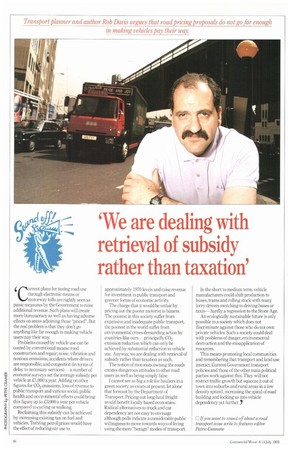'We are dealing with retrieval of subsidy rather than taxation'
Page 48

If you've noticed an error in this article please click here to report it so we can fix it.
tC urrent plans for taxing road use through electronic means or
motorway tolls are rightly seen as panic measures by the Government to raise additional revenue. Such plans will create more bureaucracy as well as having adverse effects on areas adjoining those "priced". But the real problem is that they don't go anything like far enough in making vehicle users pay their way.
Problems caused by vehicle use can be costed by conventional means: road construction and repair; noise, vibration and noxious emissions; accidents where drivers are responsible; and congestion (in terms of delay to necessary services)— a number of economic surveys set the average subsidy per vehicle at £1,000 a year. Adding on other figures for CO2 emissions, loss of revenue to public transport and various social, public health and environmental effects could bring this figure up to £3,000 a year per vehicle compared to cycling or walking.
Reclaiming this subsidy can be achieved by increasing existing tax on fuel and vehicles. Trebling petrol prices would have the effect of reducing car use to approximately 1970 levels and raise revenue for investment in public transport and greener forms of economic activity.
The charge that it would be unfair by pricing out the poorer motorist is bizarre. The poorest in this society suffer from expensive and inadequate public transport, the poorest in the world suffer from environmental crises.demanding action by countries like ours— principally CO2 emission reduction which can only be achieved by substantial reduction in vehicle use. Anyway, we are dealing with retrieval of subsidy rather than taxation as such.
The notion of motorists owning the roads creates dangerous attitudes to other road users as well as being simply false.
I cannot see as big a role for hauliers in a green society as exists at present, let alone that forecast by the Department of Transport. Pricing out long-haul freight would benefit locally based economies. Radical alternatives to truck and car dependency are not easy to envisage although polls indicate a considerable public willingness to move towards ways of living using the more "benign" modes of transport. In the short to medium term, vehicle manufacturers could shift production to buses, trams and rolling stock with many lorry drivers switching to driving buses or taxis— hardly a regression to the Stone Age.
An ecologically sustainable future is only possible in a society which does not discriminate against those who do not own private vehicles. Such a society could deal with problems of danger, environmental destruction and the misapplication of resources.
This means promoting local communities and remembering that transport and land use interact. Current Government transport policies and those of the other main political parties work against this. They will not restrict traffic growth but squeeze it out of town into suburbs and rural areas in a low density sprawl, increasing the spiral of road building and locking us into vehicle dependency yet further. / 1=1 If you want to sound off about a road transport issue write to features editor Patric Cunnane




















































































